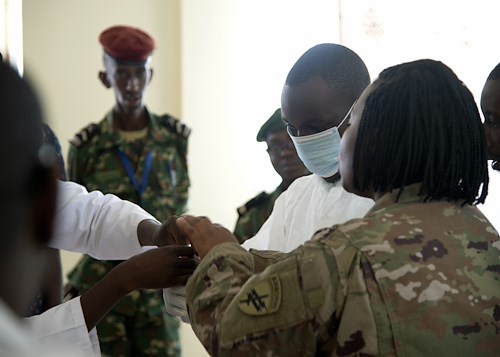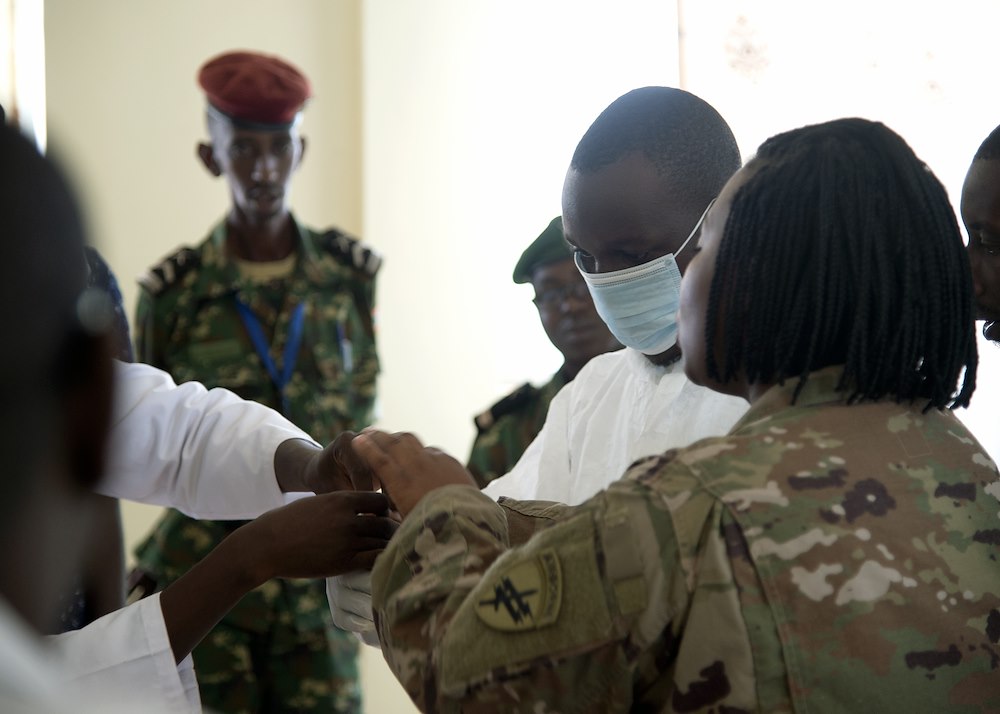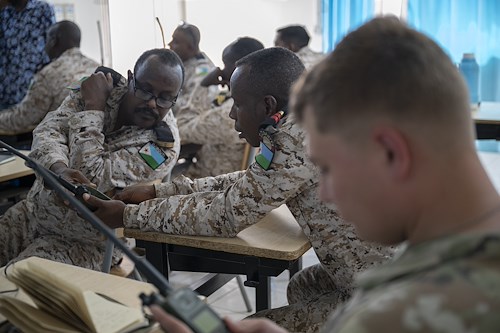Gallery contains 5 images
×
Photo 1 of 5
CJTF-HOA, Kamenge Military Hospital partner for Ebola prevention
U.S. Army Maj. Lakesha Williams, right, public health nurse for the 403rd Civil Affairs Battalion, assigned to Combined Joint Task Force-Horn of Africa (CJTF-HOA), assists hospital personnel with the donning of a hazardous material suit during a presentation at the Kamenge Military Hospital, Bujumbura, Burundi, June 18, 2019. The 403rd Civil Affairs Battalion, CJTF-HOA, and military personnel and doctors from the Kamenge Military Hospital conducted an Ebola preparedness subject matter expert exchange as a precautionary measure for personnel near the border of the Democratic Republic of Congo. (U.S. Navy photo by Mass Communication Specialist 1st Class Nick Scott)
Photo by: Petty Officer 1st Class Nicholas Scott
Photo 2 of 5
CJTF-HOA, Kamenge Military Hospital partner for Ebola prevention
U.S. Air Force Col. James Bermudez, right, force surgeon assigned to Combined Joint Task Force-Horn of Africa (CJTF-HOA); U.S. Army Capt. William Brant, center, team chief for the 403rd Civil Affairs Battalion, assigned to CJTF-HOA; and Burundi National Defence Force Maj. Jerome Irankunda, left, microbiologist and chief of laboratory services at the Kamenge Military Hospital, practice the donning of hazardous material suits at the Kamenge Military Hospital, Bujumbura, Burundi, June 20, 2019. The 403rd Civil Affairs Battalion, CJTF-HOA, and military personnel and doctors from the Kamenge Military Hospital conducted an Ebola preparedness subject matter expert exchange as a precautionary measure for personnel near the border of the Democratic Republic of Congo. (U.S. Navy photo by Mass Communication Specialist 1st Class Nick Scott)
Photo by: Petty Officer 1st Class Nicholas Scott
Photo 3 of 5
CJTF-HOA, Kamenge Military Hospital partner for Ebola prevention
Personnel from Combined Joint Task Force-Horn of Africa (CJTF-HOA) and the Kamenge Military Hospital practice doffing hazardous material suits at the Kamenge Military Hospital, Bujumbura, Burundi, June 20, 2019. The 403rd Civil Affairs Battalion, CJTF-HOA, and military personnel and doctors from the Kamenge Military Hospital conducted an Ebola preparedness subject matter expert exchange as a precautionary measure for personnel near the border of the Democratic Republic of Congo. (U.S. Navy photo by Mass Communication Specialist 1st Class Nick Scott)
Photo by: Petty Officer 1st Class Nicholas Scott
Photo 4 of 5
CJTF-HOA, Kamenge Military Hospital partner for Ebola prevention
Nursing students practice measuring vital signs at the Kamenge Military Hospital, Bujumbura, Burundi, June 17, 2019. The 403rd Civil Affairs Battalion, Combined Joint Task Force-Horn of Africa, and military personnel and doctors from the Kamenge Military Hospital conducted an Ebola preparedness subject matter expert exchange as a precautionary measure for personnel near the border of the Democratic Republic of Congo. (U.S. Navy photo by Mass Communication Specialist 1st Class Nick Scott)
Photo by: Petty Officer 1st Class Nicholas Scott
Photo 5 of 5
CJTF-HOA, Kamenge Military Hospital partner for Ebola prevention
U.S. Air Force Col. James Bermudez, center left, force surgeon assigned to Combined Joint Task Force-Horn of Africa (CJTF-HOA), and U.S. Army Maj. Lakesha Williams, center, public health nurse for the 403rd Civil Affairs Battalion, assigned to CJTF-HOA, speak with Simbaraizye Deo, a doctor and chief of emergency services at Kamenge Military Hospital, as he demonstrates one of the hand washing stations at the Kamenge Military Hospital, Bujumbura, Burundi, June 17, 2019. The 403rd Civil Affairs Battalion, CJTF-HOA, and military personnel and doctors from the Kamenge Military Hospital conducted an Ebola preparedness subject matter expert exchange as a precautionary measure for personnel near the border of the Democratic Republic of Congo. (U.S. Navy photo by Mass Communication Specialist 1st Class Nick Scott)
Photo by: Petty Officer 1st Class Nicholas Scott
BUJUMBURA, Burundi – Personnel from the 403rd Civil Affairs Battalion and Combined Joint Task Force-Horn of Africa held a subject matter expert exchange, presentation and Ebola preparedness exercise at the Kamenge Military Hospital, Bujumbura, Burundi, June 17-22.
Kamenge Military Hospital, the largest military hospital in Burundi, houses 30 specialists, 25 medical doctors, and nearly 250 nurses and technicians, and relies on medical and information exchanges with partner nations, including the U.S., to stay on the forefront of preventing the spread of Ebola.
“It’s a great partnership and we appreciate (U.S.) troops visiting us here (KMH),” said Burundi National Defence Force Col. Marc Nimburanira, director general of Kamenge Military Hospital.
Kamenge staff care for more than 600 new patients and their family members per day. The hospital provides patient services such as oncology, urology, nephrology, women’s health - including prenatal care - emergency and general medical services for Burundi National Defence Force veterans and Burundian civilians.
“We have seen our staff improving in the care they provide the patients,” said Nimburanira. “This is really important. The partnership between KMH and CJTF-HOA is so important. Nothing can break our partnership.”
Nimburanira said the hospital staff is committed to their patients and stopping the spread of Ebola, but struggles with the lack of equipment.
The U.N. World Health Organization donated tents for potential patient isolation, but more supplies will be necessary in the future.
Fighting the spread of Ebola is a top priority for KMH, but additional equipment and personnel would help that, according to Nimburanira.
Some of the symptoms of Ebola include fever, headache, sore throat, muscle pain, bloody diarrhea, lack of appetite and stomach pain. Ebola is spread through bodily fluids such as feces and urine.
Sitting only 31 miles away from the border of the Democratic Republic of the Congo, the hospital provides services to the front lines of the Ebola epidemic despite never having had a recorded case of Ebola in Burundi proper.
“As of today, there are no confirmed cases of Ebola in Burundi but we are putting our efforts together in order to prevent any cases,” said Simbarariye Deo, a doctor, chief of emergency services and head of the Ebola committee at KMH.
“The information on management of Ebola prevention is most important to our non-medical staff who deal with patients at in-processing, sometimes before a doctor or nurse even sees them,” said Deo. “We feel more and longer information exchanges would be good for KMH, like an entire week course, especially for our students and non-medical staff.”
The hospital also provides medial support for the more than 5,000 people who cross back and forth between the Democratic Republic of the Congo and Burundi every day. Doctors and nurses stand by with thermometers to check if people crossing the border show symptoms of Ebola. But with so many people crossing, it is difficult to check them all, said Deo.
“Ebola is no longer contained in the DRC,” said U.S. Army Maj. Lakesha Williams, public health nurse for the 403rd Civil Affairs Battalion, assigned to CJTF-HOA. “Doctors and military personnel from KMH are on the front lines of Ebola prevention.”
Williams led a presentation on the donning and doffing of hazardous material suits and led two exercises demonstrating what to do in case of an encounter with an actual Ebola patient.
“We want people to be prepared and that takes practice, practice, practice,” said Williams. “The first class had a lot of doctors and nurses, who had a lot of information already, but it is important for them to be updated and be able to train teach non-medical staff, like administrators.”
“If there were an outbreak in Burundi, the military would be the first to respond, so we need to make sure they have the equipment they need to fight a potential crisis,” said Williams. “We are just as concerned about Burundians as Americans.”
Exchanges like the Ebola exercise need to continue, according to U.S. Air Force Col. James Bermudez, force surgeon assigned to CJTF-HOA, and one of the presentation providers and exercise leaders during the exchange.
“Our team has made it easier to make a difference in Burundi,” said Bermudez. “It is important to establish trust between us and our partners, like Burundi; there needs to be a foundation of trust. The Burundians have been so friendly during this information exchange. It is always such a pleasure to be here.”




















